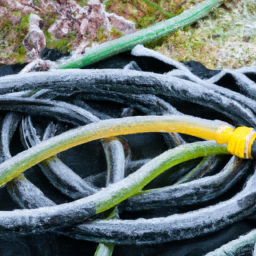How to Keep Garden Hose From Freezing
Table of Contents []
How To Keep Garden Hose From Freezing
With so many of us turning to outdoor activities to break up our days, and especially as summer draws to an end, it's essential that we keep our garden hoses in working order through the cooler months. The question becomes: how to keep garden hoses from freezing?
The answer comes down to preparation, as garden hoses are particularly prone to freezing in cold weather if there is any water left in them. Then the pipe is easily damaged after it thaws due to the frozen water inside expanding.
In this article, we'll cover 8 primary steps to prevent this damage and teach you how to keep garden hoses from freezing in the colder months.
1. Drain the Hose Completely
Start by unrolling the entire garden hose and ensuring that you expel all trace of water from it, so that it's dry as a bone inside and out. For a better result, you can gently shake the hose and loosen any remaining drops of water, as these will only freeze and worsen the situation.
2. Coil the Hose Properly
Once drained, roll or coil the hose in a wide loop to ease kinking and keep it from kinking. It is best to tighten the loops as you roll the hose to prevent any chances of it unraveling or slipping, and to help the irrigation system adapt to weather conditions in the colder months.
3. Wrap the Hose Before Storage
It is essential to wrap the hose in a protective layer of material as an added layer of insulation. To store it away for winter, use a plastic wrap and layer it multiple times for protection and to help prevent any air from seeping in.
4. Position Nothing on Top of the Hose
Before storage, make sure you've placed nothing on top of the hose. This will prevent any form of external pressure from pushing the hose down and into a rolled formation, which could cause major damage when it is unrolled later.
5. Rely on A Home Water Barrel
For an added level of insulation, use a home water barrel to store the hose. The barrel's insulation will protect the hose from extreme temperature changes, and ensure it doesn't freeze during winter.
6. Put the Hose in a Shed or Garage
Another great idea is to store the hose in a shed or garage. This will be out of direct contact with any external element, meaning that it won't be exposed to wind, rain or extreme temperatures.
7. Use An Electrical Heat Tape
Electric heat tape is another great way to keep your hoses from freezing. It works by creating an imperceptible heat source and so warming up the hose pipes. Make sure to select waterproof electric tapes with a proper power rating for the length of your hose.
8. Cover the Hose in Snow
This last step helps protect the garden hose from frost and freeze. Simply cover the hose in snow, in an even layer that covers the entire hose completely and helps moderate its temperature.
In Summary
Now you know how to keep your garden hoses from freezing in the colder months. The key steps to remember are to drain the hose thoroughly, and then wrap, insulate and store it away. An electrical heat tape or a home water barrel are both excellent measures for protection, as is covering the hose in snow.
Making sure your hoses are properly looked after in the winter months will help to ensure their longevity and ability to continue to provide water to your garden.

Previous Page
